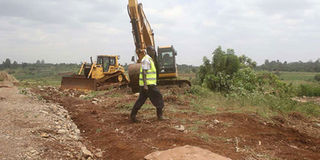Japan still hopeful about Thiba Dam

An image taken on January 10, 2018 in Gichugu, Kirinyaga County, shows the site where Thiba Dam is supposed to be constructed. The project has stalled. PHOTO | FILE | NATION MEDIA GROUP
What you need to know:
- Delays blamed on finances, difference of opinion between stakeholders and land issues.
- This year the contractor, Strabag International, sent its workers home due to a cash crunch.
- The project, which was supposed to be completed in 45 months, was commissioned by President Uhuru Kenyatta in 2017.
The Japanese government has expressed concern over delayed resumption of the stalled Sh20 billion Thiba Dam project meant to increase rice production in the giant Mwea Irrigation Scheme in Kirinyaga County.
Japan's Ambassador to Kenya, Horie Ryoichi, blamed the delays on a difference of opinion between stakeholders and land issues.
"It is true the project is delaying a little bit but I believe the problems affecting its construction will be resolved," he told journalists as he toured the multi-million-shilling private Nice Rice Millers in Ngurubani town which is owned by local entrepreneur Njiru Mkombozi.
He exuded confidence that Kenya will ensure faster completion of the mega project which is funded by Japan.
FINANCES
Construction of the dam stalled this year due to financial constraints which led to the contractor, Strabag International, sending its workers home.
A pay dispute between the firm and Treasury is at the centre of delays after the government failed to release money to the company.
Financial hiccups were further complicated by land issues after some locals, who had surrendered their land for the construction, walked back on their decision and threatened repossession.
The project, which was supposed to be completed in 45 months, was commissioned by President Uhuru Kenyatta in 2017.
Local leaders have previously warned that if the current situation is not resolved, the project risks going the Kimwarer Dam way.
ASSURANCES
Once completed, rice production was projected to double from 80,000 tonnes at the time to 160,000 tonnes a year.
Recently, Water and Irrigation Principal Secretary Joseph Irungu also assured rice farmers from the region that construction would go on.
Speaking in Rukenya village after touring the dam, he admitted that the project halted in October due to non-payment of the contractor.
He explained that Treasury had agreed to pay Strabag International while asking farmers and local leaders to be patient.
"The money to pay the contractor will be factored into the Supplementary Budget and there should be no cause for alarm," he stated.
Mr Irungu said the contractor is expected to recall workers and resume construction work soon.





